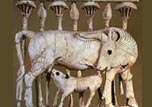Iraq under the Turkmen tribes
Kara Koyunlu (1375-1468)
Kara Koyunlu [Turkish KARAKOYUNLULAR,
English Black Sheep], is a Turkmen tribal federation that
ruled Azerbaijan and Iraq from about
1375 to 1468.
The Kara Koyunlu were vassals of the
Jalayirid dynasty of Baghdad and
Tabriz from about 1375, when the head of their leading
tribe, Kara Muhammad Turmush (reigned c. 1375-90), ruled
Mosul. The federation secured its independence with the
seizure of Tabriz (which became its capital) by
Kara Yusuf (reigned 1390-1400; 1406-20).
Routed by the armies of Timur in 1400, Kara
Yusuf sought refuge with the Mamluks of Egypt
but by 1406 was able to regain Tabriz. He then secured
the Kara Koyunlu position against threats from the
Ak Koyunlu ("White Sheep"), a rival Turkmen
federation in the province of Diyar Bakr (modern Iraq),
and from the Georgians and Shirvan-Shahs
in the Caucasus and Timur's successors
in Iran.
The capture of Baghdad in 1410 and the installation of
a subsidiary Kara Koyunlu line there hastened the
downfall of the Jalayirids themselves. Despite the
dynastic struggles for primacy in the years following Kara Yusuf's
death (1420) and continuing Timurid pressure, the
Kara Koyunlu maintained a firm grip on their possessions.
Jihan Shah (reigned c. 1438-67) established a temporary peace
with the Timurid Shah Rokh, who had helped him gain the
Kara Koyunlu throne; but after Shah Rokh's
death in 1447, Jihan Shah annexed portions of Iraq and
the eastern coast of the Arabian Peninsula as well as Timurid western
Iran.
Jihan Shah's rule was repeatedly troubled, however, by
his rebellious sons and by the semiautonomous Kara Koyunlu
rulers of Baghdad, whom he expelled in 1464. An attempt
to take Diyar Bakr from the Ak Koyunlu
in 1466 ended in Jihan Shah's defeat and death, and
within two years the Kara Koyunlu succumbed to the
superior Ak Koyunlu forces.
Ak Koyunlu (1468-1508)
Ak Koyunlu
(Turkish: "White Sheep"), is a
Turkmen tribal federation that ruled northern Iraq,
Azerbaijan, and eastern Anatolia from AD
1378 to 1508.
The Ak Koyunlu were present in eastern
Anatolia at least from 1340, according to Byzantine
chronicles, and most Ak Koyunlu leaders, including the
founder of the dynasty, Kara Osman (reigned 1378-1435),
married Byzantine princesses. In 1402 Kara Osman
was granted all of Diyar Bakr in northern Iraq
by the Turkic ruler Timur. The strong presence of the
Kara Koyunlu ("Black Sheep"), a rival Turkmen
federation, in western Iran and Azerbaijan
temporarily checked any expansion, but the rule of Uzun Hasan
(1452-78) brought the Ak Koyunlu to fresh prominence.
With the defeat of Jihan Shah, the Kara Koyunlu
leader, in 1467 and the defeat of Abu Sa'id, the
Timurid, in 1468, Uzun Hasan was able to take
Baghdad, the Persian Gulf, and
Iran as far east as Khorasan. The
Ottoman Turks were simultaneously (1466-68) moving eastward in
Anatolia, threatening Ak Koyunlu domains
and forcing Uzun Hasan into an alliance with the
Qaramanids of central Anatolia. In 1464 the
Ak Koyunlu had already turned to the Venetians,
enemies of the Ottomans, in an attempt to stave off the
inevitable Ottoman attack. Despite promises of military
aid, the Venetian arms never were provided, and
Uzun Hasan was defeated by the Ottomans in
Tercan (modern Mamahatun) in 1473.
Ya'qub (reigned 1478-90) sustained the dynasty a while
longer, but after his death the Ak Koyunlu were torn
apart by internal strife and ceased to be a threat to their more powerful
neighbours. The Safavids of Iran,
members of the Shi'ite sect of Islam, were already undermining the
allegiance of some of the Ak Koyunlu, predominantly of
the Sunnite sect. The two powers met in battle near
Nakhichevan in 1501-02, and the Ak Koyunlu "Alwand
" was defeated by Esma'il I. In his retreat from
the Safavid armies, Alwand in his turn
destroyed an autonomous Ak Koyunlu state in
Mardin, Diyar Bakr (1503). The last Ak
Koyunlu ruler, Murad, who had been contending
for power with his brothers Alwand and Muhammad
since 1497, was also defeated by Esma'il (1503).
Murad established himself briefly in Baghdad
(until 1508); but, with his retreat to Diyar Bakr, the
dynasty ended.


